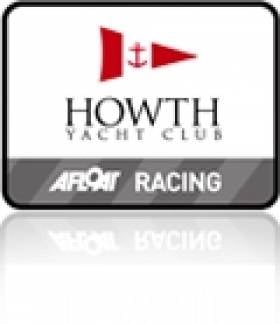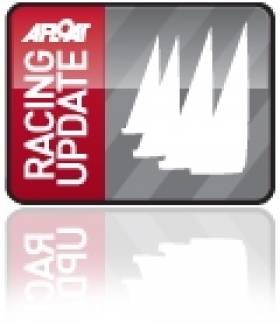Displaying items by tag: Nigel Biggs Checkmate Sailing Team
#dlregatta – In a first for Dun Laoghaire Regatta the first C&C30 design in Europe will compete for the overall title at Ireland's biggest regatta this July.
After dominating their class and being crowned top overall boat at the 2013 Dun Laoghaire Regatta, Checkmate Sailing from the Royal Irish Yacht Club are returning to Dublin Bay to defend the title. Their all conquering Humphreys Half Tonner has been replaced with Checkmate XVI, a new C&C30 from the drawing board of Wicklow based designer Mark Mills.
Skipper Nigel Biggs says "Dun Laoghaire Regatta has always been one of our favourite regattas. We have competed here for many years and having been honoured with the top boat award last time, we were determined to come back and try to retain this prestigious award.
During our last project with Checkmate XV we were fortunate to work with Mark Mills who was instrumental in turning a near 30–year–old IOR racer into a competitive IRC boat. Having sold Checkmate XV to our good friend Dave Cullen we were looking for a successor and Mark suggested the new C&C 30 that he had designed.
The boat ticked every box for us, sailed by a relatively small crew, extremely fast, trailable and with the prospect of competitive one-design racing. Checkmate XVI is the first of the class in Europe and although she has only recently arrived from the US we are already finding her extremely rewarding to sail. We are very much looking forward to bringing her to Dun Laoghaire Regatta and catching up with all our friends again
Biggs says 'we have always been made to feel incredibly welcome at this event and feel it strikes the perfect balance between competitive racing and fun socialising. I am extremely privileged to have recently been elected as a member of the Royal Irish Yacht Club and am looking forward to racing under their burgee this year'.
The C&C 30 One Design and offshore-capability and fast sailing performance at an affordable price has picked up the 2015 American SAIL MAGAZINE Best Boat award. See vid below.
{youtube}Vb2na2iwvn8{/youtube}
Promoter C&C in the USA hopes to develop the boat into a high-performance, offshore-capable one-design class that's both easy to sail and affordable compared to other grand prix boats.
The C&C 30 is loaded with go-fast goodies including a centerline sprit pole, a double-spreader carbon-fiber rig, an open transom, an offset companionway, a flush deck, plumb bow, halyard locks (main and jib) and an expansive cockpit.
The C&C 30 is being built in Bristol, Rhode Island.
Famous Half–Tonner Checkmate Gets New Berth At Howth Yacht Club
#checkmateforhowth – The story is that there has been a bit of re-juggling in the Half Tonner lineup at Howth, where Dave Cullen has moved on from the historic King One which once upon a time took the Half–Ton World Cup for the legendary Paul Elvstrom of Denmark, whose Olympic gold medal scoreline is bested only by Ben Ainslie.
The good news is that King One is going to continue to sail the waters of fair Fingal. She now has a Rush-based owner, who plans to continue to keep her at Howth where they've a handy little group of classic Half Tonners sharpening up for 2015.
And a further welcome word is that Dave Cullen himself will be returning to the fray, having taken over Nigel Biggs' all-conquering Half Tonner Checkmate. This little honey has had so much TLC and classy mods made in recent years that 'tis said a statement had to be issued saying the boat is NOT called Cheque Mate...........
#checkmate – Following a number of delays on the long road journey, Checkmate XV from the Royal St George Yacht Club finally arrived in Marseille in the early hours of Friday, the first day of racing. Having arranged launching with Corbieres Port Services at 8 am (thank goodness for email and google translate!) we managed to get the boat launched, rig stepped and motored across to Vieux Port arriving shortly before midday. After a quick sort out we managed to fasten enough fittings on to enable us to go sailing and headed of for the race area and the first start at 2pm.
The only race of the day was sailed in a gusty 15-20 knot breeze and we were delighted to return ashore, having kept the mast pointing upwards all day, to find we had managed 5th in our class of 22. Feeling very pleased with ourselves after not sailing for over 7 months and with much work still to do complete various systems onboard, we retired for an early night to catch up on much needed sleep.
Daylight the next morning saw Matt down at the boat early armed with Sikaflex and his tools to begin working his way through the job list. All the crew joined him and good progress was made before it was time to leave the dock for the race area again and the first start at 11. Three races were sailed in slightly less breeze than the previous day but this time with the benefit of warm sunshine. The starts were extremely competitive with a number of general recalls, the PRO eventually reaching for his black flag and being the lowest rating boat in the fleet we seemed to have company all the way around the race course. Whilst our boat handling was rusty we managed to keep out of too much trouble and returned ashore exhausted after 6pm having scored 3, 7, 9 for the day.
Refusing a beer, Matt got straight into the job list again and was last seen disappearing under the cockpit, tooled up, with his headlamp on, finally re-appearing in time to join us all for a late beer before bedtime.
The final day started the way all the others had, lots of activity on the boat as systems were altered and fittings added, until it was time to leave the dock. Warm sunshine again and a light breeze made it seem more like a summers day than the beginning of April and the PRO soon got into sequence. After another general recall we finally got away on a coastal race which was rather like a lucky dip for us at every mark as we had forgotten to take the SI's with us in our haste to make the start! Undeterred and benefitting from having boats to follow, we spent 2 hours sailing up and down the stunning coastline south of Marseille before the race appeared to be abandoned. Dropping our spinnaker we joined the rest of the fleet whilst the PRO waited for the new breeze to settle and eventually the final race was started.
We returned ashore to find we had scored 2nd in the final race only to be recorded as DNF in the first one of the day, a lesson if ever we needed one, on the importance of having the course information onboard. Short on time, as ever, for making our flights, we were fortunate enough to have the Jenson Button of taxi drivers who managed to get us to the airport on time.
Reflecting on the weekend we learnt (or should that be reminded ourselves of) a number of valuable lessons:
Make sure the boat is finished before leaving base.
Make sure the boat arrives on time.
Remember to take the little black box that makes the computers work.
When you only have boat speed and heading, don't throw this one remaining instrument display into the sea as it doesn't float.
Don't forget to take the SI's, particularly if you don't speak the local language, our DNF relegated us to 5th for the regatta from the 3rd we would have finished....
Despite all this we very much enjoyed our visit to Marseille and look forward to returning again for the SNIM event at Easter. In the meantime we would like to thank John Corby for the fantastic job he and his team did rebuilding CXV (again!) and Matt for his efforts in ensuring we were able to get on the water.































































